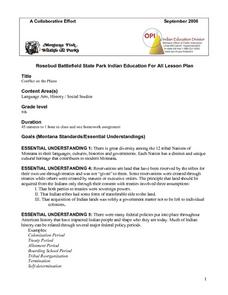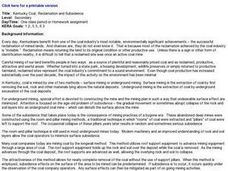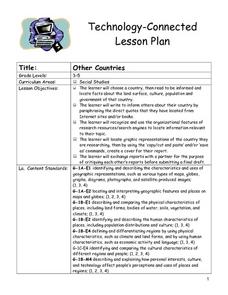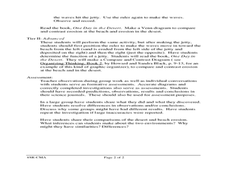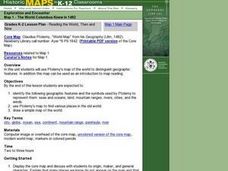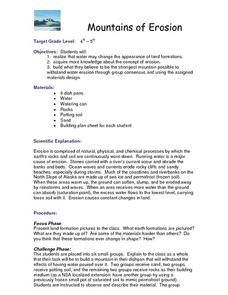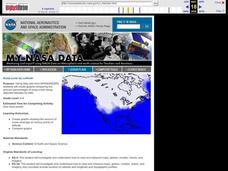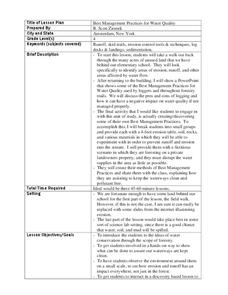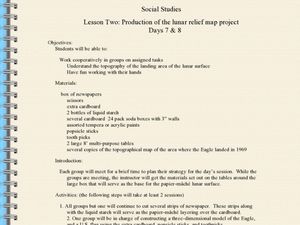Curated OER
Conflict On The Plains
Eighth graders investigate the culture and lifestyles of the Lakota Sioux and the Northern Cheyenne tribes. They use a variety of resources for research. They create questions based on information to be used during classroom discussion...
Curated OER
Kentucky Coal, Reclamation and Subsidence
Young scholars read and discuss the information that they read on the "Kentucky Coal, Reclamation and Subsidence." They then answer questions in reference to the reading. Some questions that students answer are: What is reclamation?,...
Curated OER
Other Countries
Students select a country and conduct research on the culture, population, geography, and government of their country. They conduct research using the Internet and a variety of resource books, and write and publish a report that...
Curated OER
How Many Trees Can You Grow?
Students solve a story problem about how many trees can be planted in a given area. Using a map, they gather information about the size of the area and the dimensions of an acre. They use a specific equation to determine the area of...
Curated OER
Mapping Districts
Students become literate in their use of maps. In this 2010 Census lesson plan, students visualize census data on maps, use map keys to read population maps, and explore the concept of population density.
Curated OER
Ranchers and Patterns
Fifth graders engage in problem solving. In this patterns lesson, 5th graders are presented with a problem regarding ranching that they solve as a class. Students watch a video about how patterns are used in the real world. Students...
Curated OER
The Physical Environment
Fourth graders use damp sand, a baking pan, and water to simulate erosion. For this erosion lesson plan, 4th graders participate in a simulation to show what moving water does to land.
Curated OER
National Dairy Month
Students make ice cream, make lists of dairy products, discuss cows, and more to celebrate National Dairy Month. In this dairy lesson plan, students also sing songs about dairy.
Curated OER
Literacy & Art: The Story behind the Quilt
Students examine the many ways quilts were used to chronicle the history and experiences of African slaves and African-Americans in America. They analyze a story quilt using the elements of storytelling, then create a class quilt.
Curated OER
Reading the World, Then and Now
Students distinguish geographic features using Ptolemy's map of the world.
Curated OER
Mountains of Erosion
Students study the change in land formations due to water erosion. They work in groups to build a model of a mountain that will be composed of materials that will best withstand water erosion.
Curated OER
Snow Cover By Latitude
Students create graphs comparing the amount of snow cover along selected latitudes using data sets from a NASA website. They create a spreadsheet and a bar graph on the computer, and analyze the data.
Curated OER
The Shape of Home
Students explore the diversity among homes in the world. For this diversity lesson, students share the story "Connected to Everything" which features the story of a family that was forced to leave their land and move to a reservation....
Curated OER
Best Management Practices for Water Quality
Fourth graders examine best management practices for water quality. In this water quality instructional activity, 4th graders explore unused land to identify areas of runoff, erosion, and effects of water flow. Students...
Curated OER
Farming and the Services of a Community (Lesson 5)
Young scholars identify different types of farms and services of a community. They use a pretend farm scenerio and a worksheet to distinguish between the different types of farms. They also practice using new vocabulary.
Curated OER
Canada's Geographic Position
Ninth graders investigate the characteristics of the geographic position of Quebec and Canada in the World. They study Canada's land and water boundaries, surface area and time zones.
Curated OER
America the Beautiful
Students analyze the physical geography of the United States and how we have adapted to or altered the land to create the country we know today. Students complete maps with physical features, states and cities of interest.
Curated OER
Caddo Indians Were in Arkansas First
Students identify the relationships between the land and the lives of the Caddo Indians. They write as if they were Caddo Indians and discuss how they would feed their families based on what they have learned.
Curated OER
A Look at the Population Density of the United States
Learners acquire census information and create maps of the population density of the United States on different scales. They role play the roles of workers of a retail company and they use the population data to market to their customers.
Curated OER
Catching Toe Fish
Students practice jumping rope with a two foot landing. For this jump rope lesson, students pretend to be fishermen using the rope as a fishing pole and their toes as the fish. Explicit step by step instructions are given as the students...
Curated OER
All Hands on Deck: A Harbor Education Program
Students build a model of an estuary. In this wetland lesson, students build a model estuary with a paint tray and modeling clay. They use the model to illustrate the impact of non-point pollution on the watershed.
Curated OER
Production of the Lunar Relief Map Project
Students replicate the lunar surface. In this mapping skills lesson, students study the topography of the moon. Students then use craft materials to create topographic maps of the lunar surface where the Eagle landed.
Curated OER
Governance Grade 10
Students participate in talking circles regarding governance issues. In this self-governance lesson, students examine First Nations and land claims in the Great Slave Lake area in Canada.
Curated OER
Treaties - Grade 12
Twelfth graders explore the history and current issues facing First Nations treaties. In this native studies lesson, 12th graders research modern land claims in Canada and write reports based on their findings.


